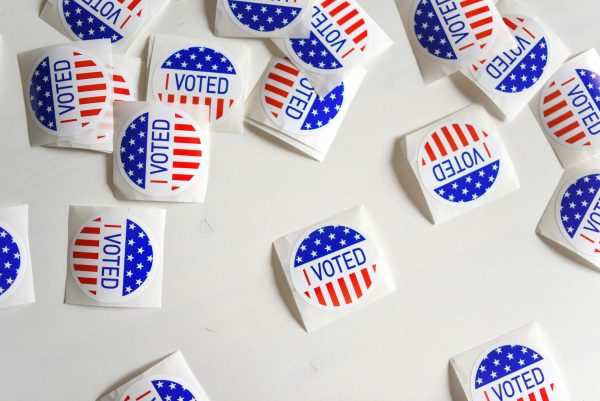AI is the Thief of Human Innovation
The true splendor of creativity is the innate humanness that is behind each stroke, each sound, each decision that a person intentionally makes. AI erases this quality from the face of the Earth.
 This year alone,
This year alone,
the functionality of AI has exploded. ChatGPT, AI generated Drake songs and fake images of Pope Francis clad in Balenciaga are experiencing
unmatched virality. These AI creations are often entertaining and widely circulated on multi-media platforms. The success of AI generated work is not, however, always a step in the right direction – it should be one of our greatest concer
ns. Between scientists’ desperate warnings and artists’ outcries, the growing capability of AI is an increasing threat to mankind.
The potential risk of AI is not nearly a new concept. Movies like “WALL-E” (2008) to as far back as “WarGames” (1983) provide commentary on artificial intelligence and human carelessness leading to our race’s demise. Warnings about AI are not just limited to the film industr
y: nearly 10 years ago, the BBC published an article where theoretical physicist Stephen Hawking stated that, “
The development of full artificial intelligence could spell the end of the human race.” Agreeing with Stephen Hawking, Technoking of Tesla Elon Musk expressed his concern for artificial intelligence, saying that it is “our biggest existential threat.” The BBC demonstrated that even in 2014, before the recent developments in artificial intelligence systems, experts were already worried about the unforeseeable future in technological advancement. When the experts are scared about the loss of control in technology’s knowledge and advancement, such as the ability to replace humans in th
eir roles in labor, art, and even emotional connection, there is a remarkable call for concern for potential catastrophe.
There are of course positive effects to the progress in technology. According to Forbes, AI is being currently used for cancer screenings, studying the survival of bees, climate change, wildlife conservation, creating tools for people with disabilities, and combating hunger and poverty. If used carefully and correctly, AI does not have to be the image of an evil robot that has gone rogue and wants to destroy the human race. Instead, AI can be used to produce solutions to global issues, at a much faster rate. But where’s the line and how do we maintain a balance of ethically using AI to our aid without bringing us to extinction?
The current fear that people share is not typically about the use of AI as an aid in creating solutions in medicine and environmentally restorative efforts; the main concern of AI is in regards to the spread of information, maintenance of jobs, and the future of artwork.
Misinformation
Chatbots and large language models (LLMs) will not always provide factually accurate information, nor are they required to. This is not necessarily harmful, until users perceive this information as truth. Open AI warns its users that the chatbot “may fabricate source names, direct quotations, citations and other details.” This is evident, with new sources, such as the Washington Post, as well
as individuals being quoted and cited falsely in work produced by the chatbots. So, LLM frequenters should not seek truthful information such as political, medical or emotional advice from these systems.
Jobs
The use of ChatGPT and other large language models have begun to play a massive role in schools and the workforce. Many students use ChatGPT to prompt their thinking, or to complete their assignments. Likewise, teachers may use ChatGPT to create lesson plans. We are also seeing companies play a role in consuming LLMs to produce draft emails and job descriptions. These AI systems are reducing busy work, but in turn, are creating and distributing work that is false or ingenuine. Op
en AI, the developer of ChatGPT released a research paper in March by Cornell University, citing that, “Our findings reveal that around 80% of the U.S. workforce could have at least 10% of their work tasks affected by the introduction of LLMs, while approximately 19% of workers may see at least 50% of their tasks impacted.” This means that specific occupations may be overtaken by LLMs. Reducing the amount of tasks done by human labor reduces the need for human labor altogether. So yes, our jobs are at risk.
Artwork
Different mediums of art, such as paintings and music are being overrun by AI. A recently released AI generated song titled “Heart on My Sleeve” features the likeness of Drake and The Weeknd’s voices. This song was created, released, and reached charts on the Billboard without the permission of Drake or The Weeknd. Of even greater ethical concern than the song being successful is the fact that AI technology has the ability to learn from artists’ existing and copyrighted work, then steal this for profit. Some artists don’t see a problem with this practice, as long as they receive compensation. Singer and songwriter Grimes wrote in April, “I’ll split 50% royalties on any successful AI generated song that uses my voice. Same deal as
I would with any artist I collab with. Feel free to use my voice without penalty.” There is no guarantee for Grimes, however, that anonymous AI music producers will, in fact, provide her share of royalties, which is where the area around ethically created AI songs becomes gray. According to Forbes, other artists such as illustrator Greg Rutkow
ski, describe their fears in the distinction of human and AI created art growing increasingly blurry. Rutkowski said, “I’m very concerned about it. As a digital artist, or any artist, in this era, we’re focused on being recognized on the internet. Right now, when you type in my name, you see more work from the AI than work that I have done myself, which is terrifying for me. How long till the AI floods my results and is indistinguishable from my works?”
Conclusion
I realize that I do not have any control over people’s AI use, nor how they intend to use these systems, but I warn that they do so with caution. According to the results of the survey conducte
d on machine learning researchers about their expectations of AI, the median respondents believed that the future effect of advanced AI on humanity will be “extremely bad (e.g., human extinction).” If we advance too far with these technologies that we have little idea about their projection, we may reach a point where
human creativity, knowledge, and ability is corrupted and replaced past a place of return.
Your donation will support the student journalists of East Lyme High School. Your contribution will allow us to purchase equipment and cover our annual website hosting costs.


